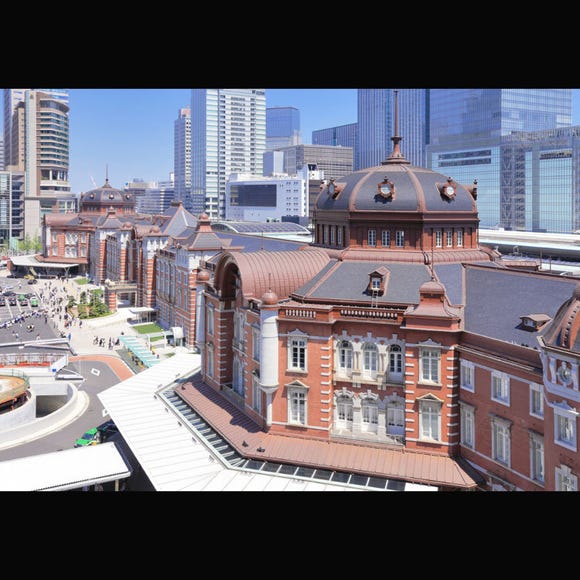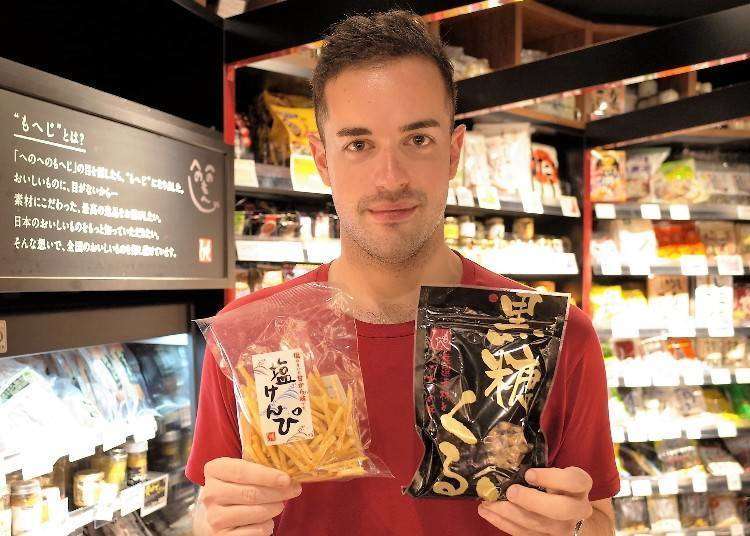
Offering elegant coffee and an abundance of imported goods, as well as a carefully selected assortment of Japanese foodstuffs, Kaldi Coffee Farm is a well-established, unique domestic brand. One of its main draws is the sample coffee, which many fans like to sip a cup of as they browse the wares that you’d be hard-pressed to find elsewhere, not to mention their original goods.
Amongst the imported goods, Italian foodstuffs like pasta and olive oil are the most prominent, giving the image of a strong Italian foodstuff collection.
On that note, today we have a bonafide Italian visiting Kaldi Coffee Farm to give us his thoughts on products - especially on what Italian ingredients he recommends.
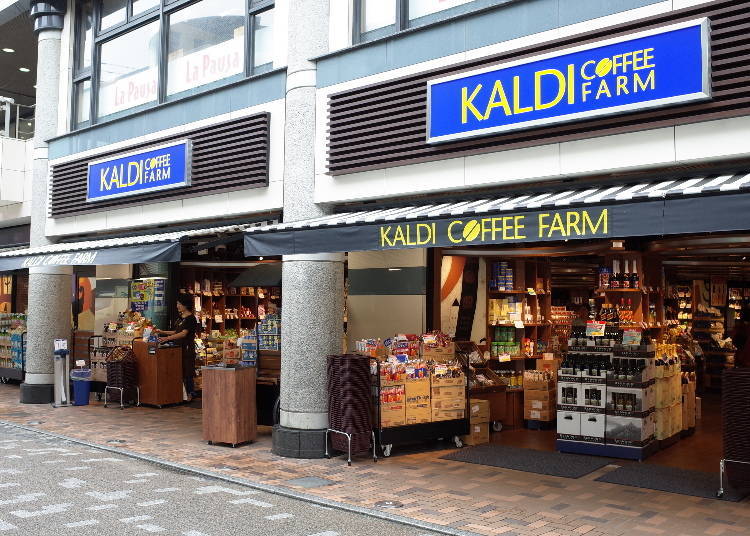
From coffee beans to a whole assortment of snacks and seasonings, and even main dish ingredients, Kaldi has an amazing variety of goods on display. Just looking at the collection excites passersby. They opened their first branch in 1986 and since then, they have over 400 outlets all over Japan.
This time we’ll be visiting the branch in Tokyo's Sengawa neighborhood. Even among the branches within Tokyo this branch is considered one of the bigger ones. It underwent a renovation this year with an updated lineup of goods.
Introducing us to the various Italian import foods is Antonio, a true-blue Italian
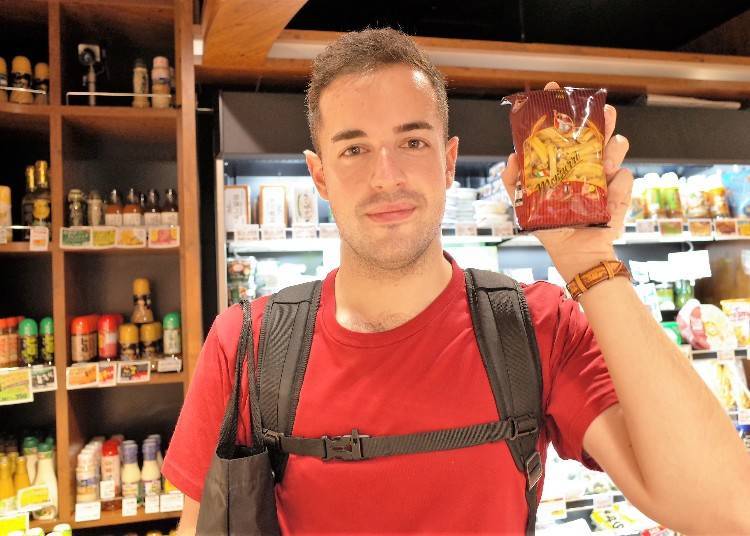
“At Kaldi there’s so much food from home. I’m looking forward to it!”
Armed with a repertoire of cooking knowledge, Antonio looks ready to share an incredible amount with us.
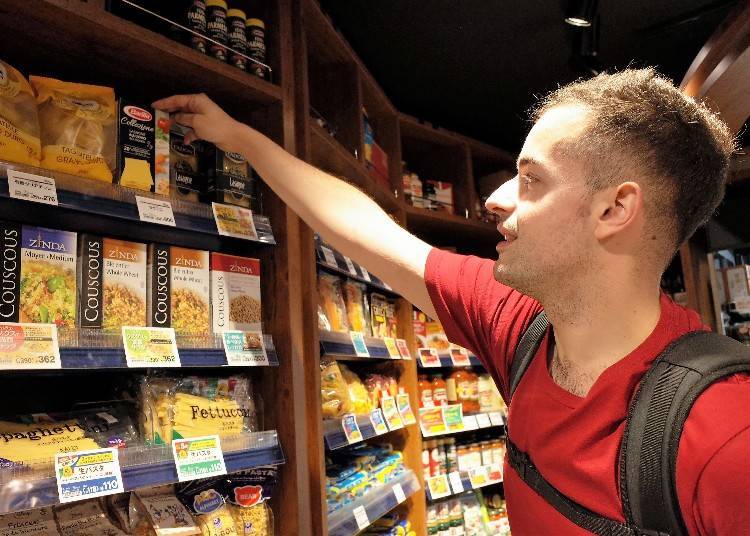
Going a quick round around the shop.
“I’ve been to the other Kaldi branches before, but this one is really huge! It’s the first time I’m seeing so many products at once,” exclaims Antonio.
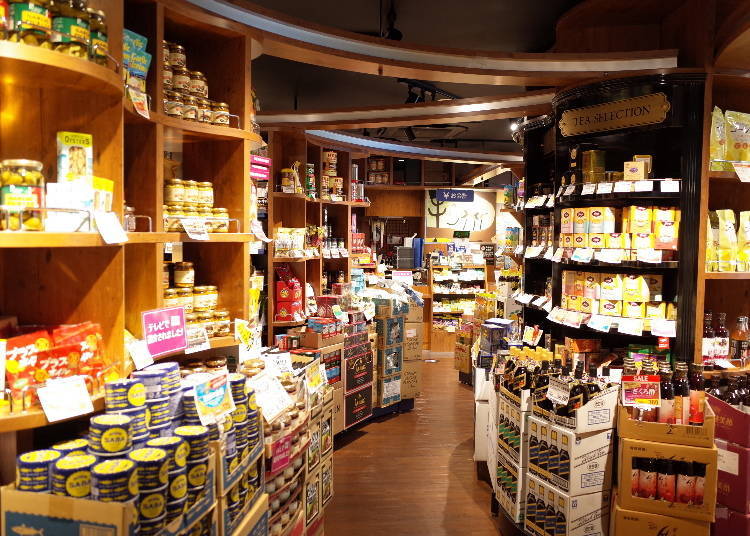
Difficult to acquire Italian ingredients, all lined up in Kaldi Coffee Farm!
●Original “Napoli Salami (60g)” (345 yen, tax inclusive)
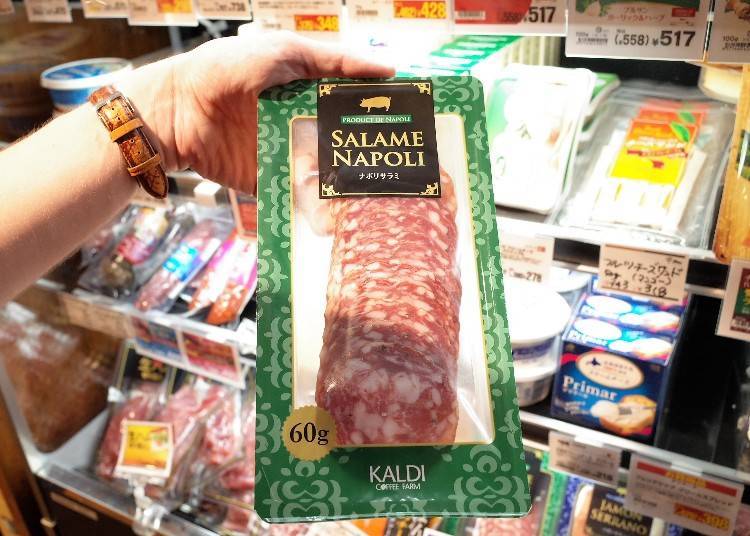
“It’s really uncommon to have Napoli Salami! There’s all kinds of salami, from Milano to Napoli, that differs from the region it’s from. It’s like how the Kanto and Kansai region in Japan have different specialties. Napoli salami is seasoned with pepper, although I’m more of a fan of Milano salami myself (laughs).”
The divide between which kind of salami is the best. Apparently, family feuds are a common thing because of this. Kind of like the whole Kansai VS Kanto debate.
●Alce nero’s organic Tagliatelle (298 yen, tax inclusive)
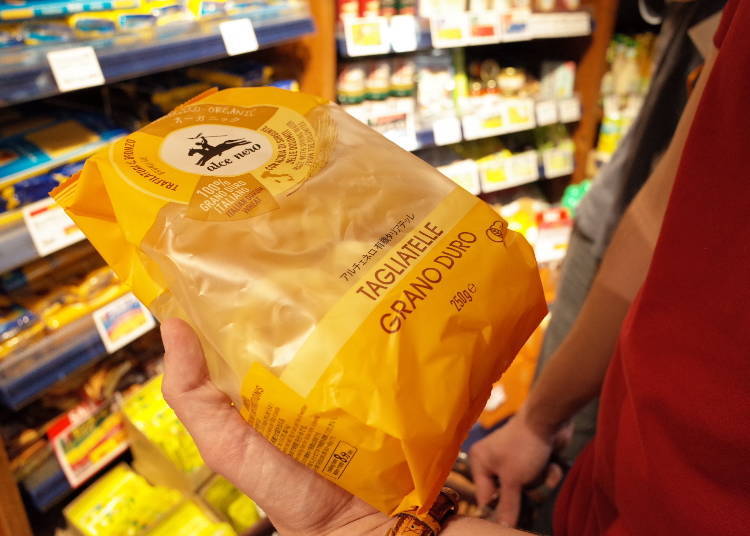
“This is also another surprisingly rare find. Alce nero’s organic farming is quite prominent in Italy, and the price here is pretty similar to Italy’s!"
Alce nero seems to be recognized for their quality even in Italy.
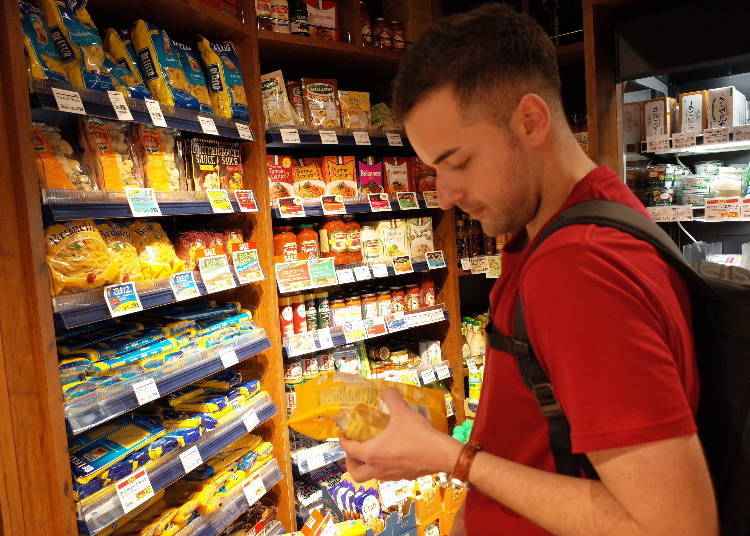
“When choosing pasta, take note of those with Bronze or Teflon written on the packet,” advises Antonio.
With pasta dies, pasta comes in all shapes and sizes, and generally they’re made using bronze dies or Teflon dies.
Bronze dies have been used traditionally, as the rough texture helps make pasta that absorbs sauce better, while Teflon dies are a relatively new method that produces a better texture and bite. Who knew there was such a method to choose between your pasta! How fascinating!
Essential ingredients for Italians
●La Preziosa’s “Canned Tomato” (98 yen, tax inclusive)
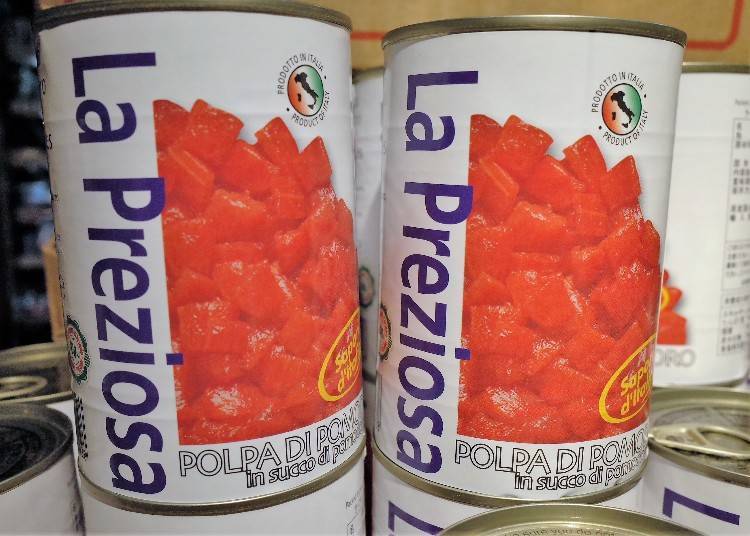
“Canned tomatoes are definitely a must. Essential for pasta!”
Here we have La Preziosa’s ever popular long selling canned tomatoes. It’s also cheap, which makes it a popular choice even among the Japanese regulars here.
●Cynara’s “boiled canned artichokes” (398 yen, tax inclusive)
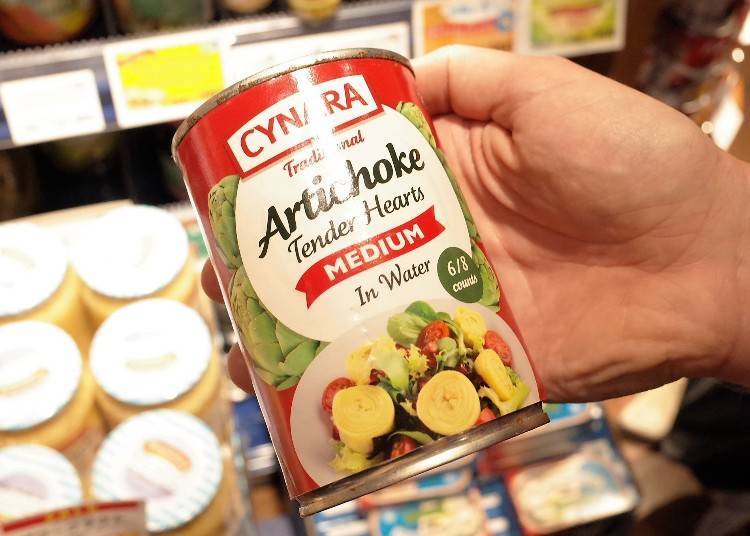
“Artichoke is not something native to Japan, but it’s something we eat often in Italy. Tastes both great grilled and in a salad.”
Artichoke is a common homemade staple for veggies in European families. Cynara’s canned artichoke in particular requires no further preparation and can be added immediately to your pasta. Being preserved in a can also makes it very convenient to keep.
●S.O.’s Capers (240 yen, tax inclusive)
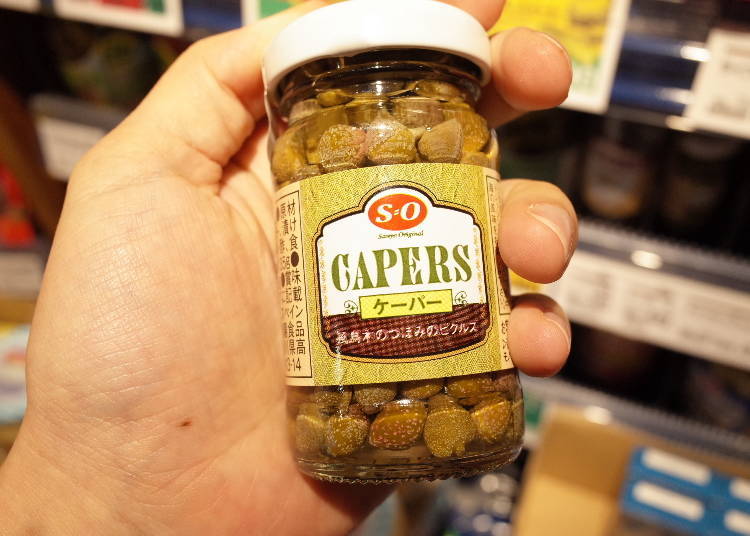
“Capers are another thing we eat a lot in Italy. Caper and tuna pasta is another great combination.”
Capers come from caper brushes and are often served pickled. The vinegar adds a nice accent to the flavor.
●Monsurr’s “dried pasta” (238 yen *price depends on type)
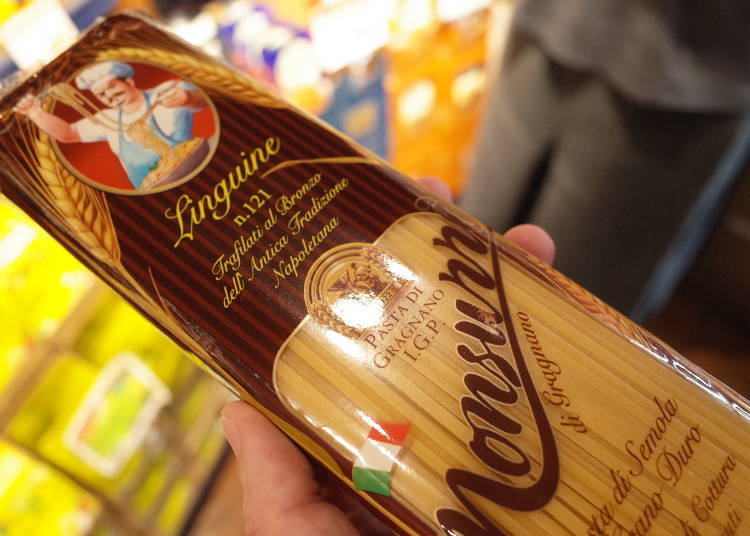
“Monsurr’s pasta soaks into the sauce pretty well, so I buy this often.”
Italy’s major products for purchase at Kaldi’s
●Colavita’s “EXV Olive Oil” 500ml (939 yen, tax inclusive)
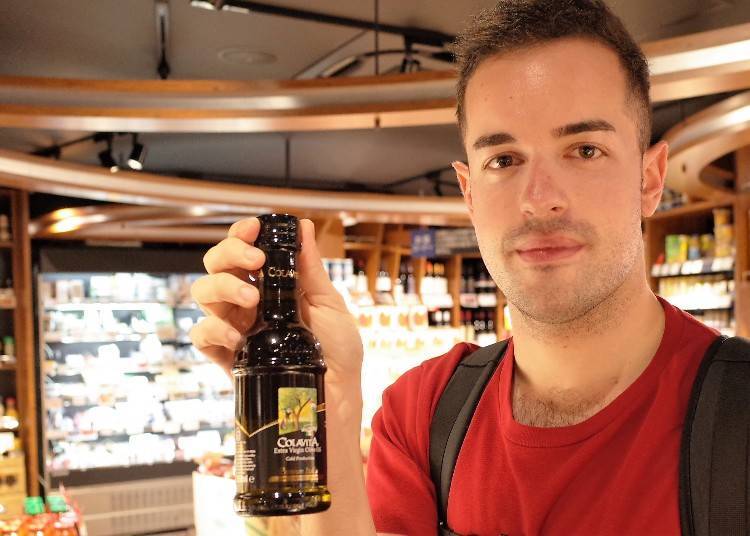
“Colavita’s olive oil is a well-known item within Italy. The one here is even extra virgin! Recently Italy has been bringing olive oil from Spain and Portugal, but to me nothing beats Italy’s domestically produced olive oil.”
At least, according to the Italy-loving Antonio.
●Loacker’s “Quadratini Vanilla” (298 yen, tax inclusive)
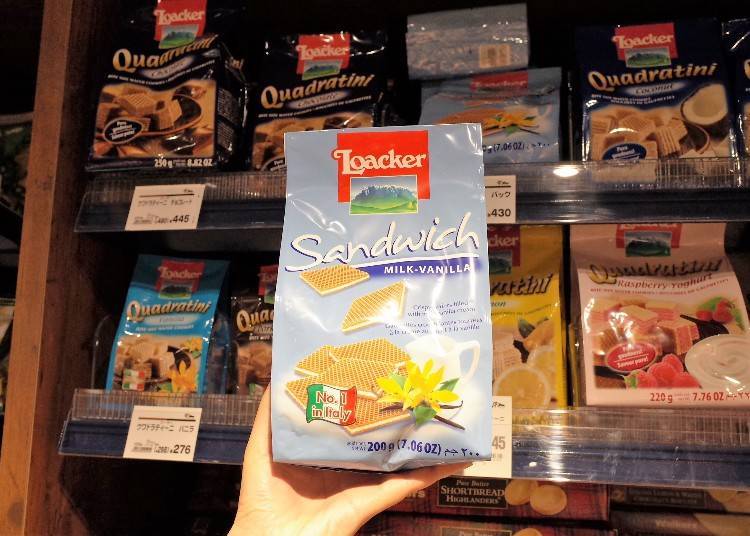
“Loacker is a longstanding famous snack maker. How nostalgic!”
Loacker is a brand that has been around for quite some time, selling vanilla and chocolate sweets. The nostalgia factor is also a big draw. By the by, Loacker was chosen in 2017 and 2018 for Italy’s Product of the Year award and is beloved by many Italians.
Antonio’s personal top picks: must-buy Italian products from Kaldi!
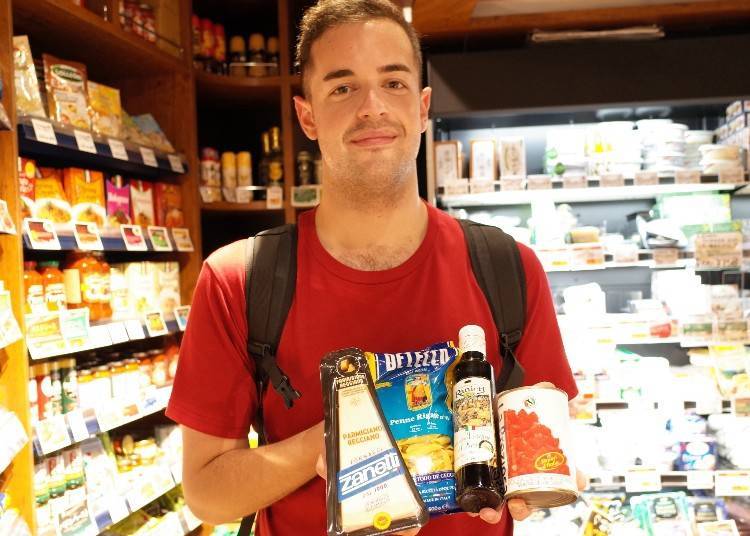
“If you’re making pasta, it has to be this!”
Including La Preziosa’s canned whole tomatoes mentioned earlier, Antonio picks out Zanetti’s “Parmigiano Reggiano”, Ranieri’s “olive oil” and finally De Cecco’s “short pasta”.
●Zanetti’s “Parmigiano Reggiano” (1015 yen, tax inclusive)
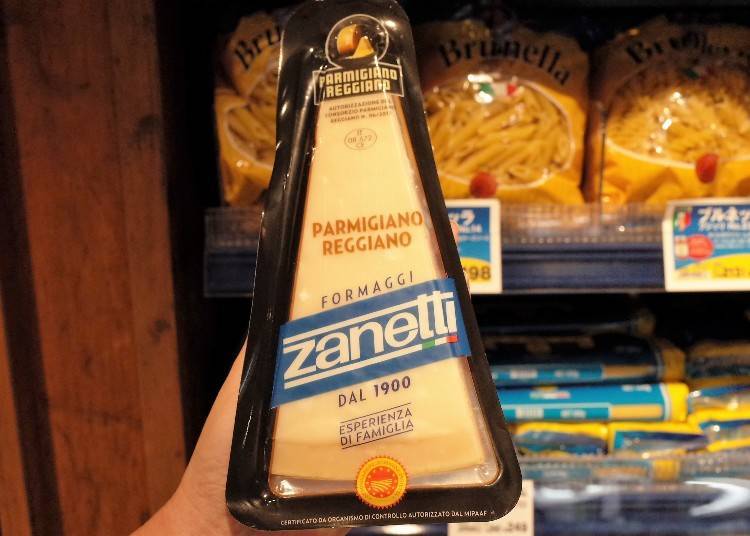
“Japanese people might not eat this often, but we often shred this atop our pasta in Italy. One thing that Japan is lacking is their cheese. Often, they have nothing but mozzarella (laughs)! Although it’s a lot cheaper and eaten way more in Italy. By the way, blue cheese is often mixed with mascarpone cheese in Italy, giving a mild pleasant flavor.”
●Ranieri’s olive oil (578 yen, tax inclusive)
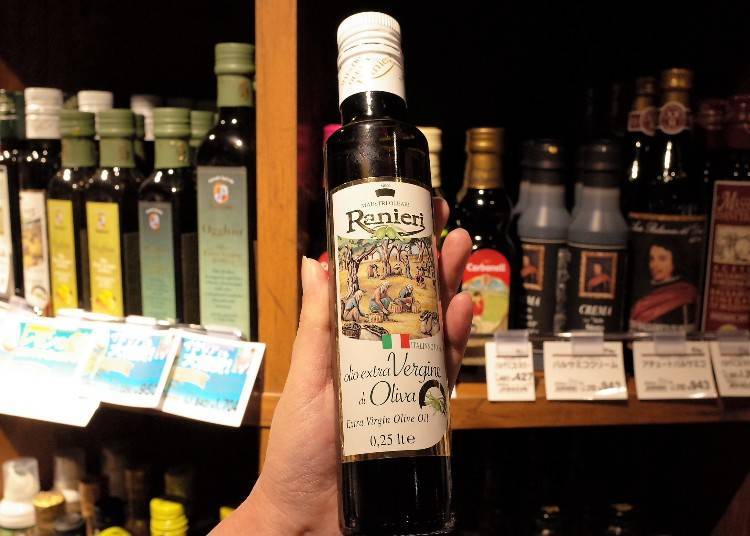
“This olive oil is made in Italy yet it’s so cheap! It’s unexpected that even though it’s an Italy specialty, they’re selling it a price not that different from the original.”
Ranieri stands out with its cost performance, being a 100% Italian product. Coincidentally, Ranieri is a common surname in Italy.
●De Cecco’s Penne Rigate (321 yen, tax inclusive)
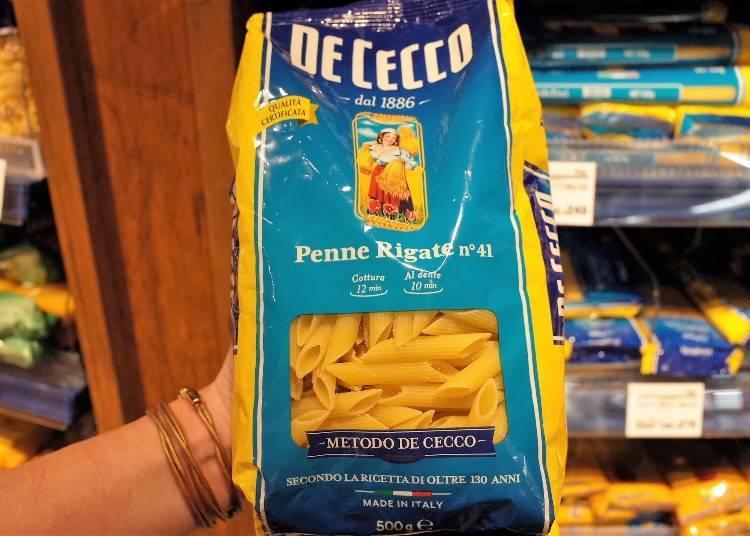
“De Cecco is another famous maker in Italy, known for their good quality. Among their goods I highly recommend their short pasta, which soaks up the sauce well. You can also make a simple and delicious aglio olio pasta with garlic and salt.”
What makes the packaging stand out is the blue pigment. Even within Italian makers it’s a major brand.
“Good pasta is made of about 13 – 14g protein. Cheap ones are often only have about 11g per serving, which is slightly less than ideal,” explains Antonio.
While pasta contains a lot more protein even among noodles, there are slight differences depending on the maker. While most packs of pasta have about 100g total of nutritional content, taking a look at the protein content might prove beneficial in the future.
While the ingredients he selected might look plain, they bring out the flavor of pasta even with simple preparation.
Some interesting Japanese selections by Antonio
●Kaldi Original “Moheji”: “Shio kenpi” and “Kuroto Kurumi”
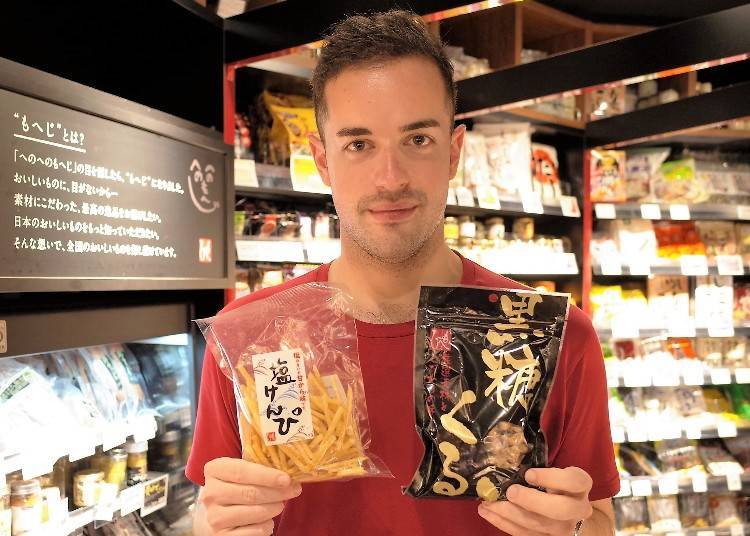
“Imo kenpi made from sweet potatoes. I’ve actually liked these kinds of Japanese snacks since a while back. It’s a nice blend of sweet and salt.”
An unexpectedly cultured taste for Japan’s candied potatoes! The salt-flavored (226 yen, tax inclusive) imo kenpi synergizes well with the sweetness, giving birth to an extremely addictive flavor.
“The kuroto kurumi contains a walnut in the center. It’s quite tempting.”
The kuroto kurumi (321 yen) is traditional Japanese-style sweet that goes well coffee, making it popular with the coffee maniacs of Kaldi.
●Cheese Factory’s Tamarizuke Cream cheese & Kanemoto Brewery’s Gorogoro Garlic
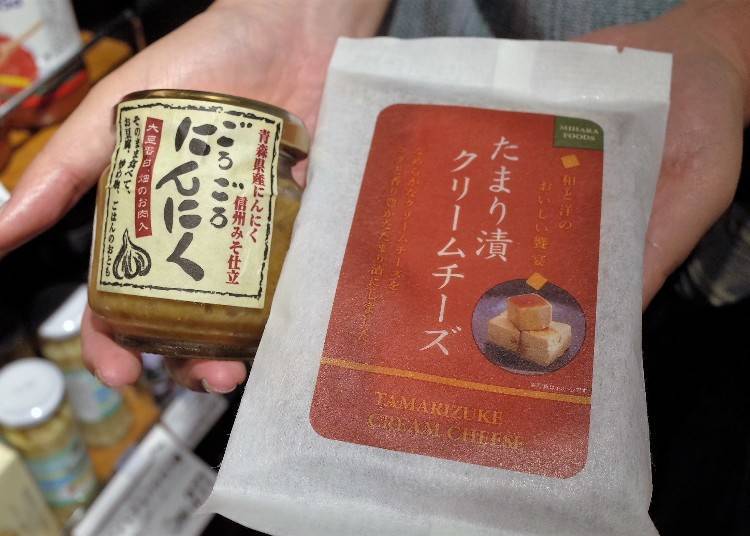
“I love garlic, and this particular one looks like it can be used as seasoning as well, so it caught my interest.” Remarks Antonio as he grabs a jar of the Gorogoro Garlic (432 yen, tax inclusive).
Following up, he picks out the Tamarizuke cream cheese (532 yen, tax inclusive), “You can’t forget the cheese! This taste is particularly unique to Japan. Looks pretty interesting.” Another keen choice!
If you’re speaking of Kaldi Coffee Farm, you can’t forget their coffee!
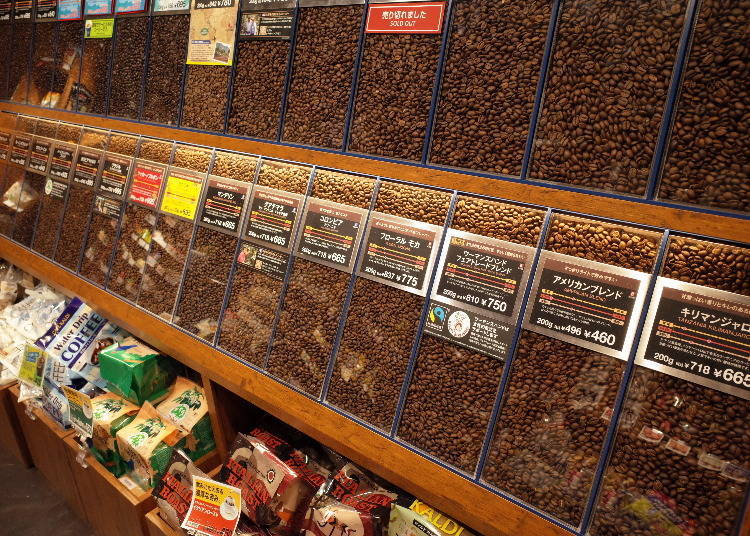
And what’s Kaldi Coffee Farm without their coffee? A selection of 30 different coffee beans from all over the world. Selling 200g per pack, you can pick your favorite of their selection of beans.
Throughout the year, their most popular blend is the Mild Kaldi (496 yen, tax inclusive). The gentle sweetness of Brazilian beans makes this blend a must try product.
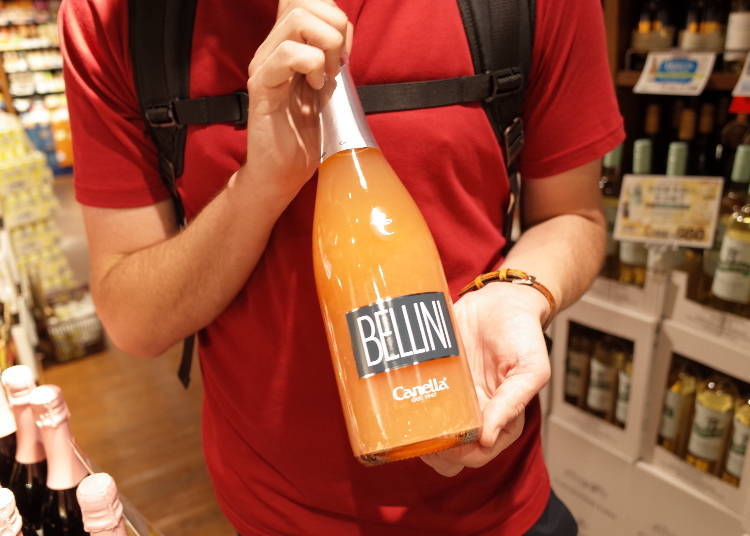
Not only coffee, but their wine selection is also wide. Kaldi Coffee Farm also has a fine collection of sweet wine, making it popular with female customers as an entry drink into the world of wine.
Here, Antonio has picked out Bellini (1625 yen, tax inclusive), a fruity cocktail chock-full of fruitiness.
“I drank some of this even back in Italy. It was easy on the throat.”
Shop recommendations!
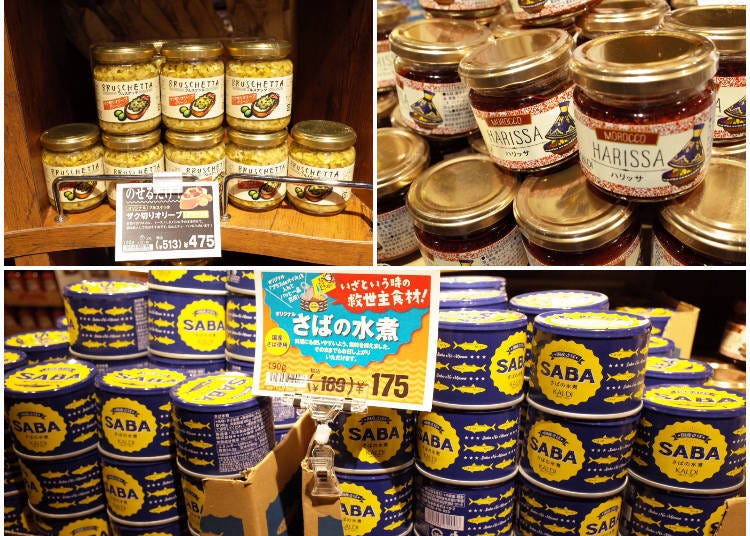
Here we have the items recommended by the store’s staff.
[Top left] Their “Finely chopped Bruschetta Olive Greens” (513 yen, tax inclusive) can be used as a spread on baguettes, mixed in pasta, or even eaten on its own. It’s a handy item to have on hand, making it hugely popular.
[Top right] The “Original Harissa” (513 yen, tax inclusive) is made with a paprika base, on top of chili peppers and other spices mixed in, useful when you want to get a more Middle Eastern flavor.
[Bottom] The Sengawa branch’s top pick: Kaldi’s Original canned Saba (189 yen, tax inclusive). This went on sale in May 2018, and since then it’s received a hearty reception.
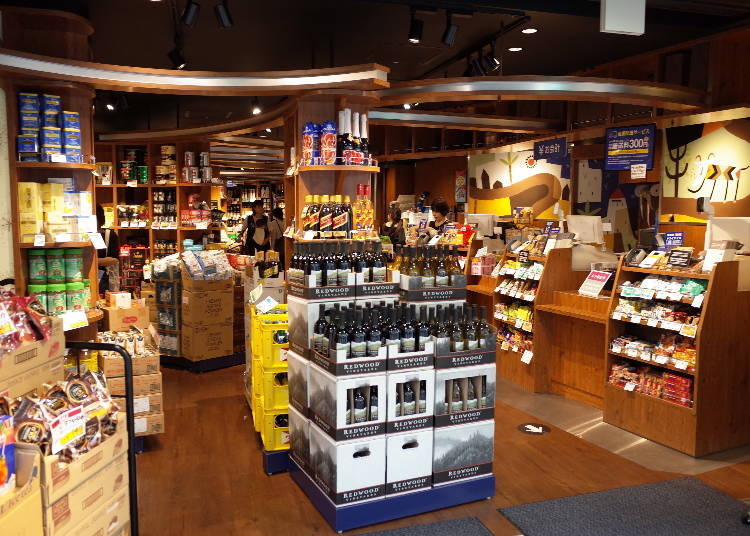
“Having this much rare imported goods is Kaldi’s strength. With this much variety, you can make food from all over the world! The establishment is also wide, and gives a relaxed refreshing feeling,” marvels Antonio as he takes in the sheer variety of goods.
“While all these groceries are tempting, I’m quite interested in buying the coffee beans too.”
Their Italian foodstuffs are also a staple in Italy, so one can replicate the authentic Italian flavor just by shopping at Kaldi. They also continuously update their selection with new goods, a tempting treat for the regulars who spot them. Make your way to your nearest outlet and enter the world of Kaldi!

*Prices are as of August 8, and stock availability is dependent on outlet.
Written by: Yajima Miyuki
-
Kaldi Coffee Farm Sengawa Branchカルディコーヒーファーム 仙川店
- Address Tokyo-to Chofu-shi Sengawa-machi 1-49-2 Pale Sengawa 1F
-
Nearest Station
Sengawa Station (2-minute walk)
- Phone Number 03-5384-5217
Open daily
10:00-21:00
*Prices and options mentioned are subject to change.
*Unless stated otherwise, all prices include tax.
Popular Tours & Activitiess
Recommended places for you
-
Ad

Discover the "Miraculous Forest" in the Heart of Tokyo: The Institute for Nature Study (9 Minutes from JR Meguro Station)
-

Jujutsu Kaisen Takes Over JR East With a Wrapped Shinkansen This Winter
by: Guest Contributor
-

How to Get Don Quijote's Exclusive 2025-2026 Winter Gift (+Tax-Free Savings)
-

Japan’s Shinkansen Is About to Change Travel in an Unexpected Way
by: Guest Contributor
-
Ad

(Opening in Jan 2026) 'THE SUMO LIVE RESTAURANT HIRAKUZA GINZA TOKYO!' 5 Exciting Ways to Experience the World of Sumo!
-

This Winter, Godzilla Takes Over Haneda Airport
by: Guest Contributor
Inspiration for Accommodations
-

Enjoy Mt. Fuji from the Comfort of Your Room! Recommended Ryokan with Mt. Fuji View
-

Stay Near the Cherry Blossoms! Hotels for Cherry Blossom Viewing in Tokyo
-

Family-Friendly Hotels with Free Shuttle to Disneyland: Convenient Access for a Magical Stay
-

Top Ranked Hakone Hotels with Mt. Fuji View: Enjoy Stunning Scenery from Your Private Space
-

Convenient Tokyo Hotels with Airport Shuttle: Ideal for Families and Heavy Luggage
-

Stunning Tokyo Tower View Hotels: Enjoy Spectacular Scenery from Your Private Space
-

Convenient Asakusa Hotels with Kitchens: Ideal for Extended Family Visits
-

Experience Luxury: Hakone's 10 Best Five-Star Accommodations
-

Enjoy Mt. Fuji Autumn Leaves! Top Hotels Near the Popular Autumn Leaves Corridor
-

Experience Hakone Fall Foliage from Your Room with Stunning Views
-

Tokyo Tsukiji|Tsukiji Area Map & Sightseeing Information
-

(Video) Walking Tour along Narita Omotesando - Quaint Historical Village near Narita Airport!
by: Victor Gonzalez
-

7 Best Winter Events in Tokyo: Chilly Evenings, Shiny Holidays (November/December)
-

Matsuya Ginza: 5 Popular Food Souvenirs at Tokyo's Famous Department Store!
by: Naho Jishikyu
-

The Best of Japan: 11 Major Cities Every Traveler Should Visit
-

Cycle around the stunning Seto Inland Sea; enjoy hands-on activities on a farm
- #best ramen tokyo
- #what to buy in ameyoko
- #what to bring to japan
- #new years in tokyo
- #best izakaya shinjuku
- #things to do tokyo
- #japanese nail trends
- #what to do in odaiba
- #onsen tattoo friendly tokyo
- #daiso
- #best sushi ginza
- #japanese convenience store snacks
- #best yakiniku shibuya
- #japanese fashion culture
- #best japanese soft drinks
















